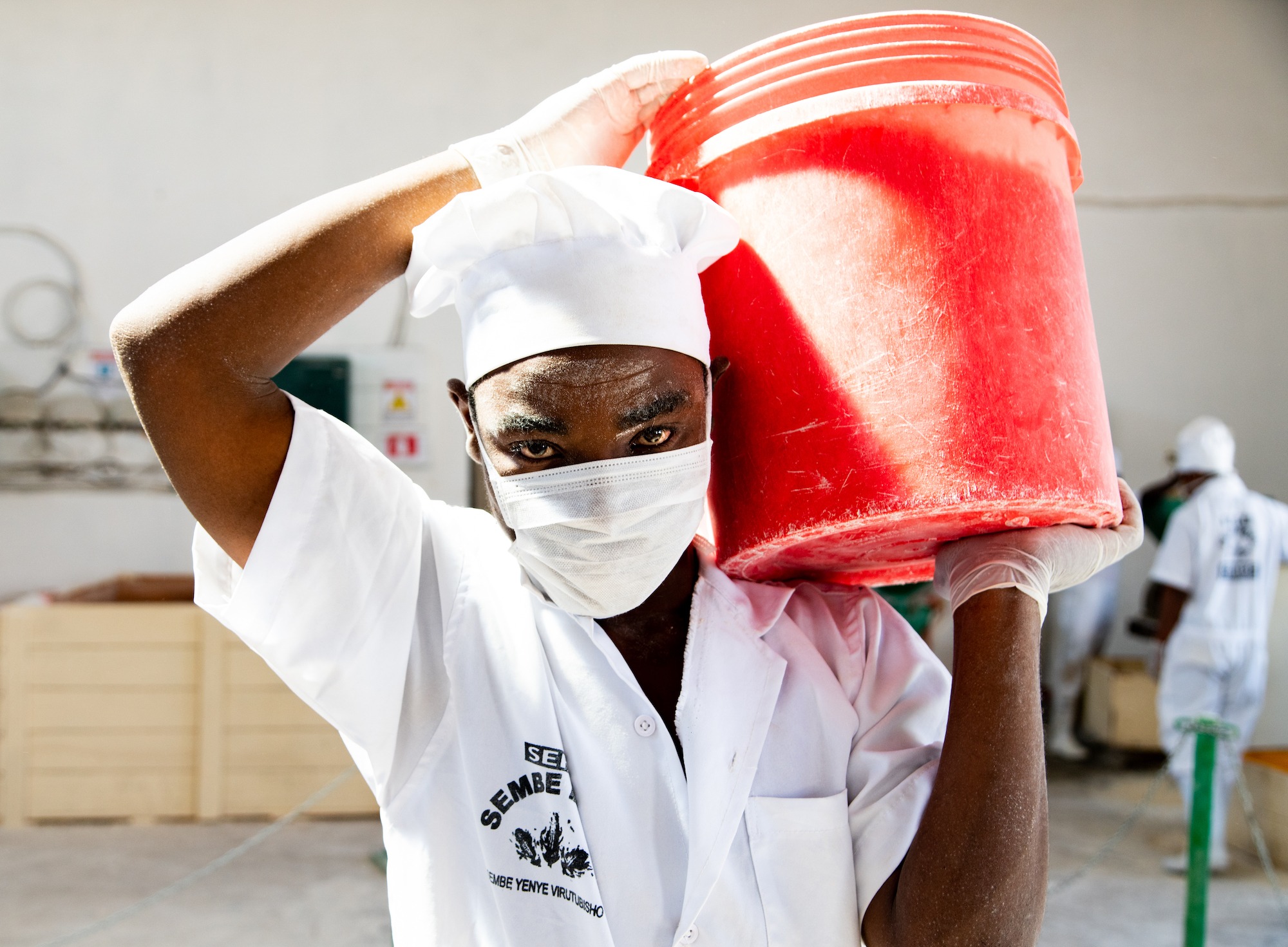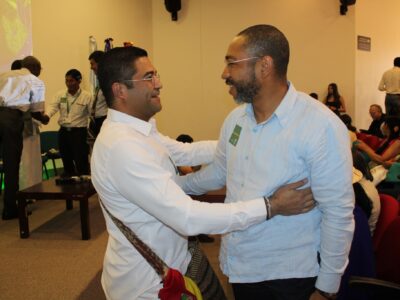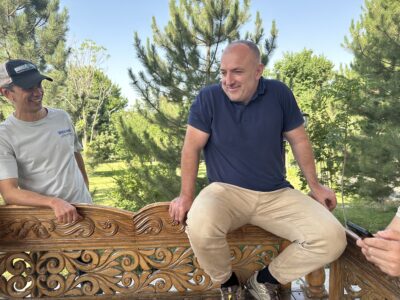
COVID-19 is challenging the world to adapt, and, in doing so, creating two distinct problems in our food and agricultural systems.
The first is that productivity and food demands are shifting quickly and simultaneously. Demand is shifting, as many people spend less due to lost jobs and incomes as well as social distancing and stay-at-home orders. Supply is also being disrupted by bottlenecks in supply chains and distribution channels and limited access to physical trading spaces and critical services, such as mechanization and transport. Many businesses are now too cash-strapped to invest in adapting their businesses. The result is unstable food prices, less access to nutritious food, lower incomes, and less long-term profitability.
The second problem is poor access to health information and products, which is affecting how consumers and businesses engage in food and agricultural systems. Amid this breakdown in connectivity to trainings, products, and messages, consumers face exploitation, a loss of trust, and potential health risks.
How can global development organizations mitigate two seemingly disastrous problems? ACDI/VOCA, like many organizations, is adapting. Our inclusive market systems approach has always aimed to take on large, systemic problems and find ways to make markets work better for poor and marginalized people. Now, programs we implement around the world are applying aspects of this approach to develop the resiliency of markets and market actors severely impacted by COVID-19.
1. Assessing the Impact of COVID-19
The first step many of our programs took was assessing the potential damage. The USAID/Honduras Transforming Market Systems Activity surveyed 1,178 enterprises from 16 of Honduras’s 18 departments and found that most businesses in Honduras will close within three months unless they receive emergency financial assistance. This data informed proposals collectively drafted by the Honduran government, National Tourism Reactivation Board, Chamber of Tourism, and National Institute of Tourism.
Other programs, like the USAID-funded Feed the Future Kenya Livestock Market Systems Activity, are supporting local partners, such as the Turkana Chamber of Commerce, to survey businesses and collect data of their own. The program is also partnering with the International Livestock Research Institute to survey the livestock sector of Northern Kenya.
2. Collaborating with Governments on Policy Interventions
These rapid assessments can inform governments as they consider policies supporting COVID-19 recovery, like in Honduras, where the USAID/Honduras Transforming Market Systems (TMS) Activity assessment informed the government’s decision to pay employees suspended from their tourism-related jobs a monthly salary for six months.
In Bangladesh, the USAID-funded Feed the Future Bangladesh Rice and Diversified Crops (RDC) Activity team is working with the private sector to report bottlenecks in supply chains to policymakers. The team is also coaching businesses to lobby for the lifting of import restrictions on certain agricultural inputs and permits to allow them to transport inputs and commodities into areas under lockdown — both of which will help stabilize prices and markets.
3. Providing Financial and Technical Assistance
Many local enterprises will require grants to get back on their feet. In the Kyrgyz Republic, local entrepreneurs are finding ways to ease the shortages of medical face masks. To support these entrepreneurs, the USAID Enterprise Competitiveness Project in the Kyrgyz Republic provided a US$17,744 grant to the Art Pro Public Foundation to begin manufacturing single-use medical face masks in May. The grant funded the assembly of the production line and created several new jobs. Art Pro plans to donate the first 30,000 masks to government institutions working on the frontlines of preventing the SARS-CoV-2 spread, and the next batch of 70,000 masks will be sold to the public at pharmacies.
Many businesses not only need emergency grants, but also technical assistance to become resistant to ongoing shocks. The Feed the Future Ghana Agricultural Development and Value Chain Enhancement II Project, funded by USAID, is strengthening networks of outgrower businesses to organize the supply of inputs, such as fertilizers, and procurement of commodities. The team is also facilitating the distribution of personal protective equipment and information through these networks to ensure the safety and continuity of food production.
4. Adapting Business Models
As markets remain closed and people adapt to a socially distanced world, many businesses will rely on new distribution channels. In Bangladesh, the RDC Activity is working with the second largest mobile network operator in the country, Robi Axia Ltd., to provide smallholder farmers and rural businesses with access to low-cost smartphones. These smartphones can come with micro SD cards preloaded with extensive training materials. Farmers can then use mobile technology to seek advice on their crops as well as receive important market and public health messaging. Similarly, the Feed the Future Bangladesh Livestock Production for Improved Nutrition Activity expanded the app Shurokkha, developed by its partner mPower Social Enterprises, to provide remote veterinary services and advice to local livestock service providers.
In Honduras, the TMS Activity is helping enterprises diversify their distribution channels and move toward e-commerce. Read more about how one enterprise, JJ-Agro, adapted its business model and withstood the early shocks of COVID-19.
5. Using Existing Networks to Ensure the Flow of Information
Businesses have a moral and financial incentive to protect the health of their consumers. To ensure consumers have access to products and information, development organizations’ existing partnerships, supply chain infrastructures, and other pathways should be leveraged.
In Burkina Faso, a worsening security situation meant that the Victory against Malnutrition Plus (ViMPlus) Activity, funded by USAID’s Office of Food for Peace, already had a system for disseminating audio recordings in local languages to communes via telephone or mobile devices. In Bangladesh, the RDC Activity, is working with companies and service providers to embed public health messaging in marketing campaigns and provide disinfectant spraying in public places, such as wet markets.
In Colombia, USAID and ACDI/VOCA’s Emergency Response in Arauca II Program is providing advice over the phone about family protection and access to care, such as emergency aid programs implemented by the government and other agencies. The program, which aims to improve the availability of sustainable food production, is also advising participants remotely on how to maintain their home gardens.
In Tanzania, the Feed the Future Tanzania NAFAKA II Activity team is providing tablets preloaded with training materials on good agricultural practices to more than 50 of its most active and engaged participants.
The Future of Food and Agricultural Systems
COVID-19 has created a resilience stress test for food and market systems around the world. Market systems approaches that identify opportunities and then leverage businesses’ resources and incentives to seize those opportunities will help economies cope with the current crises.
While the immediate focus remains on the outbreak itself, ACDI/VOCA is keeping sight of the long-term economic recovery phase, in which the world will have to design new ways of engaging the private sector to foster resilience and mitigate future disruptions.
Comments






